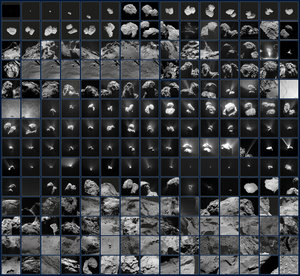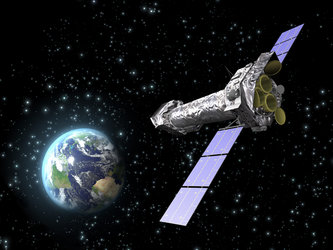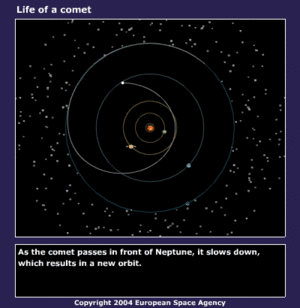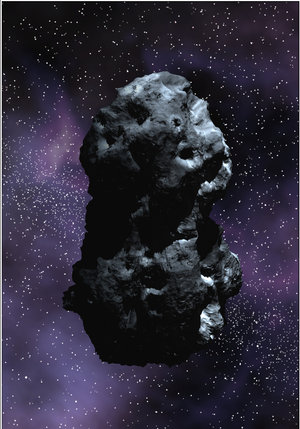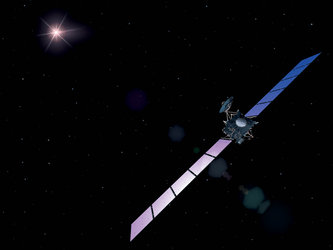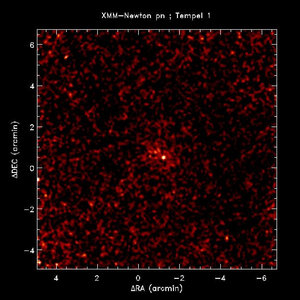Here for the duration: An interview with Kristin Wirth
When Rosetta is launched in February 2004, it will be just the beginning of an 11-year journey. A lot can change in science and technology over such a period. But, fortunately for Rosetta, Kristin Wirth will make sure that the spacecraft keeps up with the times, even when it is millions of kilometres out in space.
| Dr Kristin Wirth Science Operations Team, ESA Rosetta mission Born: 14 January 1968 in Wuppertal, Germany Diploma in Physics, University of the Ruhr, Bochum, Germany. PhD, University of Stuttgart, on the properties of solid surfaces. After working in the semiconductor industry in Munich, Kristin had been working for just two days at the Technological University of Berlin, when she was asked to consider an important position on the Rosetta mission, co-ordinating the future science experiments on the spacecraft. In August 2003, she joined ESA to work at ESTEC on Rosetta. Kristin is a founder member of ESTEC’s Astronomy Club, and she also enjoys ballet dancing. |
ESA: Rosetta is getting very close to its launch date. How are you feeling?
The job just gets more exciting as we get nearer to the launch date...
Kristin Wirth: The job just gets more exciting as we get nearer to the launch date. Although I am also a little bit scared and I have to admit that I will be happier once it is over.
ESA: What is your role on the Rosetta mission?
Kristin Wirth: Half of my time is spent organising how the information that comes in from Rosetta will be archived. There are very strict rules on how this information should be arranged so that scientists from all over the world can access it in a way that they understand.
We have to decide on the structure the information will take, within a software program, so that when data starts being delivered, they can slot right in. I imagine that the first delivery will be very stressful, and we will have to check everything, but eventually it will become routine, so that the information slots straight into the software that we have devised.
The second part of my job is planning the possible outcomes for the mission. If you think about it, we actually know very little about our target. We know that the comet is roughly the shape of a potato, measuring about three or four kilometres across, but little else. Therefore it is impossible to plan the mission exactly – we have to come up with many different scenarios and plan for all of them. It is not until we get there and can map the comet that we will know which scenario will be used. And we could still get a big surprise!
For example, I have to work out when each experiment on board Rosetta can be switched on, since some of them may disturb each other, or there may not be enough power for others to operate all the time. I have to analyse what science has to be achieved and then put together a sequence of commands that allows it to be achieved.
ESA: What is your favourite part of the job?
What a wonderful machine a spacecraft is!
Kristin Wirth: I love to work with people from all over Europe and the USA. I also really appreciate the chance to see the spacecraft and all its instruments at close quarters. It has made me realise just what a wonderful machine a spacecraft is! The instruments are so complicated, and work almost autonomously – it is a great opportunity for me to try to understand exactly how they work.
ESA: What are the problems that you face in planning a mission whose arrival is so far in the future?
Kristin Wirth: Well, 10 years is a very long time, and a lot can change in that time. And it is not just in science and technology - also many of the teams that I currently work with may have split up and been replaced by other people by then.
With 11 instruments on the orbiter and a lander, there will be a lot to do once we arrive at the comet, so it is very important that the teams are have had plenty of practice at working together on all the different scenarios that we have come up with. I certainly hope to still be working on the project then and, if I am lucky, I will have had three or four years of practice with each team, too!
ESA: What would your advice be to somebody who wanted to work in space science?
Kristin Wirth: My interest in astronomy and space science started at school. I always wanted to work in a laboratory, which was why I took up physics at school. I think it was good that I made up my mind early about what I wanted to do.
At the same time, I would advise against becoming too specialised too early on in your career. I think it is beneficial to have experience of working in a company, as well as in the environment of a university or research institution.





